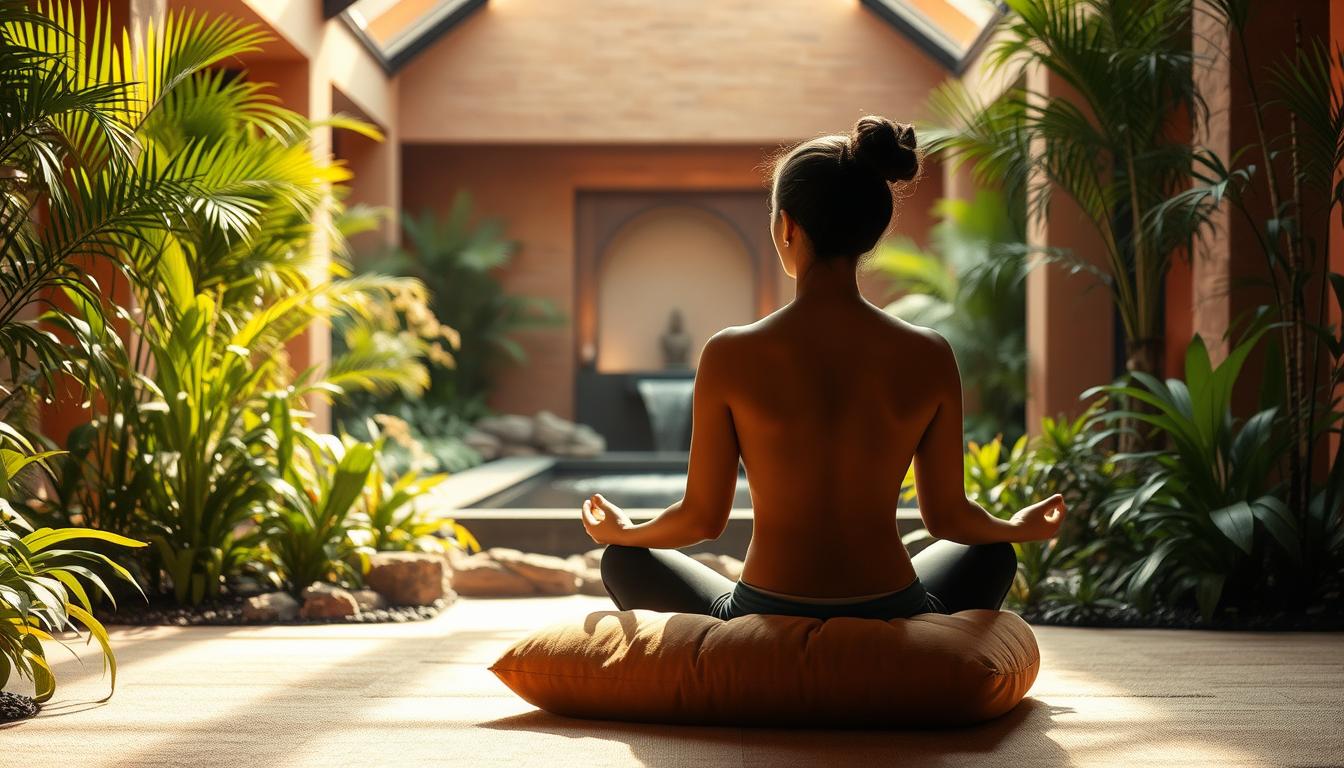I still remember the first time I practiced meditation – it was a simple act that changed my perspective on stress and mindfulness. As we navigate through our hectic lives, we often find ourselves looking for ways to stay centered and focused.
Meditation is a habitual process that helps train our minds to focus and redirect our thoughts. As more people discover its many benefits for our health, its popularity continues to grow. By incorporating this practice into our daily lives, we can increase our awareness of ourselves and our surroundings, reduce stress, and develop concentration.
As we dive into the world of meditation, we will explore its core purpose and how it can transform our daily lives. We will examine how it serves as a practical tool for modern living, helping us navigate stress and enhance our overall wellbeing.
Key Takeaways
- Discover the core purpose of meditation and its role in modern life
- Understand how meditation can help reduce stress and improve focus
- Learn about the science-backed benefits of regular meditation practice
- Explore how meditation can enhance self-awareness and emotional intelligence
- Find out why millions of people worldwide have incorporated meditation into their lives
Understanding Meditation: More Than Just Sitting Still
As we dive into the world of meditation
it is clear that this practice has existed for thousands of years, originating mainly from Buddhist practices, but also rooted in ancient Hindu civilization more than 2,000 years ago.
While there are different types of meditation practices, the core idea remains the same: to cultivate awareness and understanding of our mind and thoughts.
Defining Meditation in Modern Context
In today’s context, meditation is understood as a mental exercise that helps train our brain to observe our thoughts without getting caught up in them.
It is an active mental training that develops our ability to direct and sustain attention deliberately, much like a gym workout for our mind.
As a result, meditation has evolved from ancient spiritual practices into a mainstream wellness activity backed by scientific research.
A Brief History of Meditative Practices
The history of meditative practices is rich and diverse, with roots in various cultures and religions.
The word “meditation” is derived from ancient Latin, translating to “to reflect” or “to contemplate.”
While the term “meditation” is relatively modern, the practice has been a part of many cultures and religions, including Eastern religions, where it is still a powerful part of their traditions.
Over time, meditation has been adapted from its religious origins into secular practices that anyone can benefit from, regardless of their spiritual beliefs or background, promoting mindfulness and awareness.
What Is The Purpose Of Meditation: Core Objectives
As we dive into the core objectives of meditation, we uncover its profound impact on our mental landscape. Meditation, at its core, is a practice that helps train our mind and enhance our overall well-being. According to Jon Kabat Zinn, mindfulness meditation is about being present in a self-compassionate and nonjudgmental way.
Let’s explore some key aspects of meditation’s core objectives.
Training Attention and Awareness
One of the primary meditation aims is to train our attention, helping us focus on what truly matters. Through regular practice, we can improve our ability to stay focused, reduce mind-wandering, and enhance our awareness of the present moment. This is achieved by:
- Strengthening our attention muscle, reducing the impact of distractions and mental chatter
- Creating space between stimulus and response, giving us the freedom to choose our reactions
- Developing the ability to observe our thoughts without identifying with them
For more information on how meditation works, we can refer to resources like Mayo Clinic, which provides an in-depth look at the practice.
Cultivating Mental Clarity and Emotional Stability
Another crucial aspect of meditation is its role in cultivating mental clarity and emotional stability. Regular meditation practice helps quiet the constant background noise of worry, planning, and rumination, leading to clearer thinking. Moreover, it helps us recognize emotional patterns as they arise, allowing us to respond with intention rather than react on autopilot.
By achieving these objectives, meditation helps us lead more balanced lives, making it a valuable practice for those seeking to improve their mental and emotional well-being.
Different Types of Meditation and Their Unique Purposes
Meditation isn’t a one-size-fits-all practice; it’s a diverse toolkit with various techniques tailored to different needs and goals. As we explore the different types of meditation, you’ll discover that each style offers unique benefits, allowing you to choose the approach that best addresses your personal goals and resonates with your temperament.
Mindfulness Meditation: Present Moment Awareness
Mindfulness meditation trains you to observe the present moment without judgment, making it particularly effective for reducing stress and increasing self-awareness. By focusing on the here and now, you can cultivate a deeper understanding of yourself and your surroundings.
Focused Attention Meditation: Developing Concentration
Focused attention meditation works to strengthen your concentration by repeatedly bringing your mind back to a single point of focus, like your breath or a mantra. This practice helps improve mental clarity and discipline, enabling you to stay focused on your goals.
Loving-Kindness Meditation: Cultivating Compassion
Loving-kindness meditation specifically targets your capacity for compassion and positive emotions toward yourself and others. By practicing metta meditation, you can develop kind thoughts and feelings, extending them to friends, acquaintances, and even those you may find challenging.
By understanding the different types of meditation, such as mindfulness meditation and loving-kindness meditation, you can choose a practice that suits your needs, enhancing your awareness and overall well-being.
Physical Health Benefits of Regular Meditation
Regular meditation practice can have a significant impact on our physical health, going beyond the well-known mental benefits. As we explore the physical health benefits of meditation, we find that it can bring about changes in our body’s functioning, leading to overall better health.
Research has shown that meditation can improve physical health by reducing strain on the heart. For instance, high blood pressure, over time, makes the heart work harder, leading to poor heart function. A 2015 meta-analysis of 12 studies found that meditation helped reduce blood pressure, with more significant effects observed among older participants and those with higher initial blood pressure levels.
Reducing Blood Pressure and Heart Rate
Regular meditation has been shown to reduce blood pressure by activating the body’s relaxation response and decreasing the production of stress hormones that constrict blood vessels. This reduction in blood pressure can lead to a lower risk of heart attack and stroke, as it helps prevent the narrowing of arteries associated with high blood pressure. Moreover, meditation can improve heart rate variability, a key marker of cardiovascular wellness and resilience.
Managing Chronic Pain and Physical Symptoms
Meditation can also help manage chronic pain conditions by changing the relationship with pain sensations, rather than just trying to eliminate them. A 2017 review of 38 studies concluded that mindfulness meditation could reduce pain, improve quality of life, and decrease symptoms of depression in people with chronic pain. By addressing the mind-body connection, meditation can improve physical symptoms across various conditions.
By incorporating meditation into our daily routine, we can experience these physical health benefits firsthand, leading to an improved physical health and overall well-being.
Mental Health Transformation Through Meditation
The impact of meditation on mental health is a topic that’s both personal and backed by science. Meditation has been shown to have a positive effect on various aspects of mental health, from reducing stress and anxiety to improving cognitive function.
Stress and Anxiety Reduction
Meditation acts as a natural antidote to stress by activating the parasympathetic nervous system, promoting a “rest and digest” mode that counterbalances the fight-or-flight response. Regular mindfulness meditation practice can help decrease physiological markers of stress, such as increased cortisol and heart rate, which can have wide-ranging impacts on sleep, blood pressure, and overall well-being. Research suggests that various forms of meditation can help reduce job-related anxiety and improve feelings of well-being.
Improving Focus and Cognitive Function
Focused attention meditation is like weightlifting for your attention span, helping to increase its strength and endurance. Studies have shown that people who practice meditation experience improved attention and accuracy while completing tasks. This is particularly valuable in today’s notification-filled world, where distractions are plentiful.
Enhancing Memory and Mental Clarity
Regular meditators often report improved memory and mental clarity, benefits that extend from young adults to older populations concerned about cognitive decline. By training the mind to focus more effectively and resist distractions, meditation provides a complementary approach to managing symptoms of various mental health conditions.
By incorporating meditation into daily life, individuals can experience these benefits firsthand, leading to a more balanced and healthy mental state.
Emotional Benefits: Creating Inner Balance
Meditation is a powerful tool for achieving emotional balance in our lives. By cultivating a regular meditation practice, we can develop a greater understanding of our emotions and learn to navigate them more effectively.

Developing Self-Awareness and Emotional Intelligence
Meditation helps us develop emotional intelligence by creating space to observe our feelings without immediately acting on them. This mindfulness allows us to recognize our emotional triggers and patterns, giving us the ability to respond more thoughtfully rather than react impulsively. As we become more attuned to our emotions, we can better understand ourselves and those around us, leading to more harmonious relationships.
Breaking Free from Emotional Reactivity
Regular meditation practice helps break the cycle of emotional reactivity by training us to pause between feeling and response. This pause gives us the freedom to choose how we express our emotions, rather than being controlled by them. As a result, we can experience our emotions fully without being overwhelmed, achieving a sense of inner balance. For more insights on how meditation can improve emotional balance, you can visit The Benefits of Meditation for Emotional.
By developing this emotional awareness through meditation, we can improve our relationships and overall well-being. As we become more mindful of our feelings and thoughts, we can steer them toward more constructive patterns, leading to a more fulfilling life.
- Meditation creates space to observe feelings without immediate reaction.
- Regular practice builds self-awareness and recognizes emotional triggers.
- Meditation teaches experiencing emotions fully without being overwhelmed.
Spiritual Growth and Self-Discovery
The path to spiritual growth and self-discovery is intricately linked with the practice of meditation. By creating a quiet space for introspection, meditation allows us to tune into our inner voice, beyond the noise of daily life and societal expectations. This journey inward fosters a deeper sense of connection to ourselves and the world around us.
Connecting with Your Inner Self
Meditation offers a powerful way to access deeper states of consciousness, enabling us to understand our true nature. By practicing mindfulness and meditation, we can declutter our minds, eliminate negative feelings, and become more emotionally resilient. This practice helps us discover ourselves in the truest sense, clarifying our personal values and understanding of purpose.
Meditation Across Different Spiritual Traditions
Various spiritual traditions have embraced meditation as a means to achieve spiritual growth. For instance, in the Muslim Sufi tradition, meditation aims to purify the mind and heart. In Hinduism, the goal is to achieve liberation (moksha) by realizing the nature of one’s self (atman). Similarly, Christian traditions use meditation for contemplation and experiencing a deeper connection with the divine. These practices share common elements of stillness, presence, and inner attention, highlighting the universal appeal and benefit of meditation.
| Spiritual Tradition | Meditation Practice | Goal |
|---|---|---|
| Muslim Sufi | Purification through meditation | Emptying the mind and heart of spiritual pollutants |
| Hindu | Meditation for self-realization | Achieving liberation (moksha) |
| Christian | Contemplation and centering prayer | Experiencing God’s presence |
Making Meditation Part of Your Daily Life
Establishing a consistent meditationpracticerequires some planning, but the benefits are well worth the effort. As we try to incorporate this practice into our daily lives, we need to consider our schedules and lifestyles.
Starting Small: Practical Tips for Beginners
When starting a meditation practice, it is crucial to begin with manageable goals. Starting with just3-5 minutes a daycan help build a habit that sticks. For those with hectic lives, finding a quiet spot or using an application that guides meditation can be beneficial. If regular work and home environments do not allow for consistent, quiet alonetime, consider participating in a meditation class. This can provide a supportive community and improve your chances of maintaining a consistent practice.
Creating a Sustainable Meditation Practice
To make meditation a sustainable part of your daily life, you need to create environmental cues that support your practice. This can be done by designating a specific spot in your home for meditation or using apps or timers that help you stay consistent. Integrating brief moments of mindfulness throughout yourdaycan also complement your formal sitting practice. For example, taking a few minutes during your lunch break to focus on your breath can be beneficial.

Here is a simple table to help you plan your meditation practice:
| Time of Day | Duration | Method |
|---|---|---|
| Morning | 5 minutes | Guided meditation |
| Lunch break | 3 minutes | Mindfulness |
| Evening | 5 minutes | Focused attention |
By incorporating meditation into your daily routine, you can experience its numerous benefits and make it a valuable part of yourlife.
Common Misconceptions About Meditation’s Purpose
When it comes to meditation, there are several misconceptions about what it’s truly meant to achieve. Many people have unrealistic expectations or misunderstand the practice entirely.
It’s Not About “Emptying Your Mind”
One common myth is that meditation is about completely emptying your mind of thoughts. However, it’s actually about changing your relationship with those thoughts, not eliminating them. Meditation helps you become more aware of your mind and its patterns, allowing you to manage your thoughts more effectively.
Beyond Relaxation: The Deeper Purpose
Meditation is often misunderstood as merely a relaxation technique. While it can be calming, its deeper purpose is to train your attention and cultivate qualities like compassion and equanimity. Through meditation, you’re developing mindfulness and learning to navigate your mind in a more skillful way. It’s not about achieving a special state; it’s about becoming more familiar with your ordinary mind and learning to work with it more effectively.
- Meditation isn’t about stopping your thoughts completely; it’s about observing them without getting caught up.
- It’s a practice that goes beyond relaxation, focusing on developing awareness and concentration.
- Meditation can be practiced in a secular context, focusing on mental training and well-being.
Conclusion: Embracing Meditation’s Transformative Power
As we reflect on the various facets of meditation, it becomes evident that its impact goes beyond mere relaxation.
Meditation’s benefits extend to reducing stress and anxiety, improving our health, and enhancing our overall life.
Through regular practice, we can cultivate a deeper sense of mindfulness and awareness, allowing us to navigate life’s challenges with greater resilience.
The practice of meditation, including guided meditation, is accessible to everyone, regardless of their background or current state of well-being.
As we embrace meditation, we will realize that its true power lies in helping us find our inner strength and fostering a more profound connection to ourselves and others, thus improving our overall health benefits and reducing stress anxiety.
FAQ
How does meditation help reduce stress and anxiety?
Meditation helps reduce stress and anxiety by training your mind to focus on the present moment, promoting relaxation, and decreasing the production of stress hormones like cortisol. Regular meditation practice can also help you develop a more balanced response to stressful situations.
Can meditation really help manage chronic pain?
Yes, meditation can help manage chronic pain by increasing the brain’s pain tolerance and decreasing emotional reactivity to pain. Some studies have shown that regular meditation practice can reduce the symptoms of chronic pain and improve overall quality of life.
What types of meditation are most beneficial for physical health?
Mindfulness meditation and loving-kindness meditation are often used to promote physical health, as they can help reduce blood pressure, heart rate, and chronic pain. Other types of meditation, like focused attention meditation, can also be beneficial for overall well-being.
How can I start a meditation practice if I’m new to it?
Start by setting aside a few minutes each day to practice meditation, using guided meditation resources if needed. Begin with short sessions, being gentle with yourself as you develop your practice, and gradually increase the duration as you become more comfortable with the practice.
Can meditation help improve my focus and cognitive function?
Yes, meditation can help improve focus and cognitive function by training your mind to stay focused and aware. Regular meditation practice has been shown to improve attention, memory, and mental clarity, making it a valuable tool for improving cognitive function.
Is meditation only for people who are spiritual or religious?
No, meditation is not limited to people who are spiritual or religious. Meditation is a practice that can be used by anyone, regardless of their beliefs, to promote overall well-being, reduce stress, and improve mental clarity.

https://t.me/s/Top_BestCasino/5
https://t.me/Top_BestCasino/8